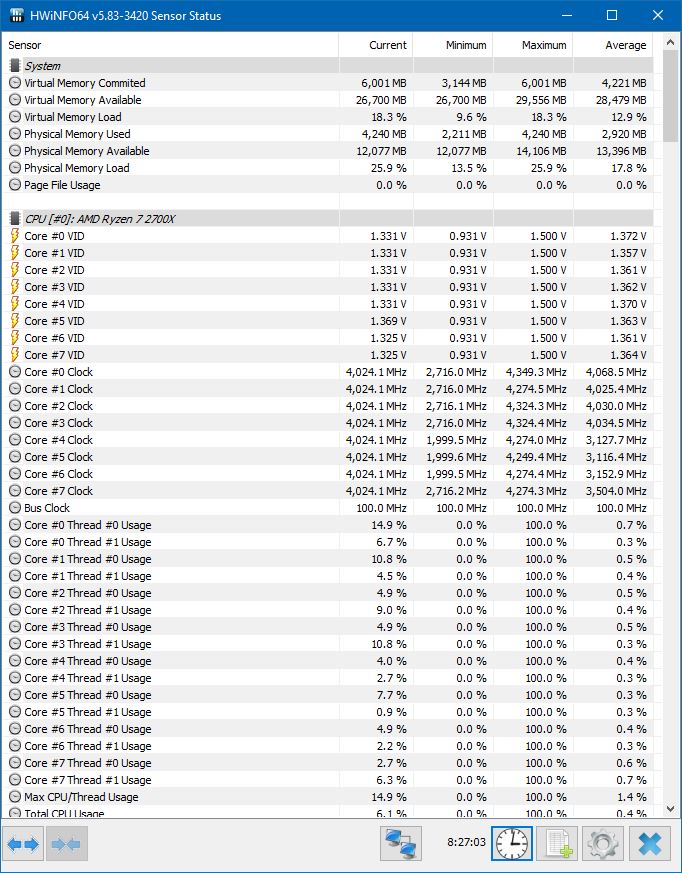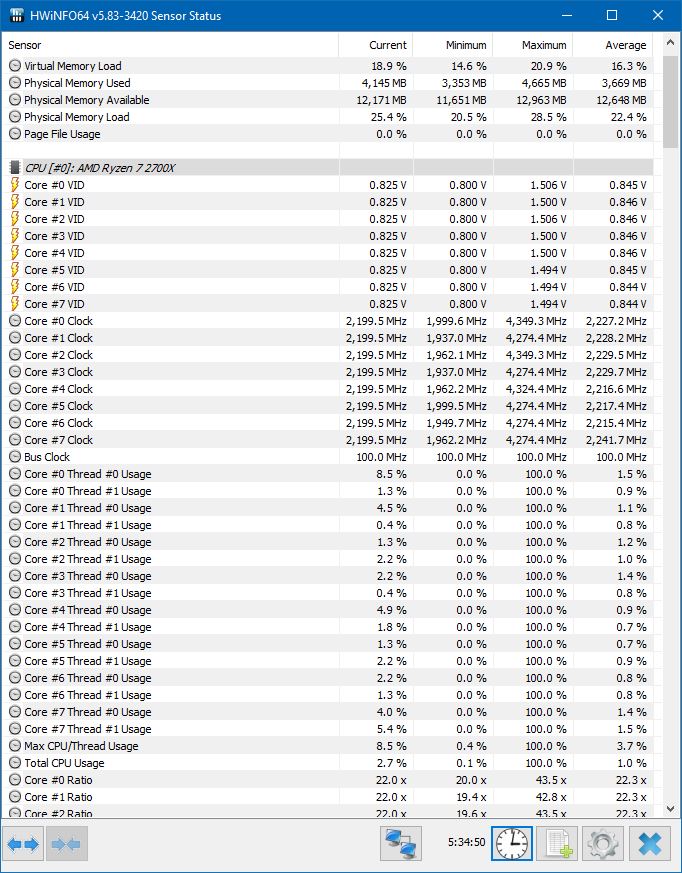3.20 was the best BIOS they've done for Ryzen 1 for sure, I could run 3.9/3466 on that, i've just flashed to 4.60 in preparation for a 2700X and I can't get 3466 stable at all with the same settings I was previously using. I've just bunged the XMP on for now until I get my new CPU then i'll tweak again.
You are using an out of date browser. It may not display this or other websites correctly.
You should upgrade or use an alternative browser.
You should upgrade or use an alternative browser.
The ASRock thread [support/feedback/etc]
- Thread starter AsrockMB
- Start date
More options
Thread starter's postsAssociate
- Joined
- 6 Dec 2007
- Posts
- 1,757
- Location
- Cambridge
I'm hoping they'll improve things over the year, but those x470s aren't going to sell themselves... I'm resigned to buying an x570 next year at this rate.
Associate
- Joined
- 23 May 2004
- Posts
- 626
- Location
- staffordshire
im on the 3.30 bridge bios using the taichi x370.
"seems" stable enough on the 3.30 bridge ... but was thinking of upgrading to the 2700X however seeing as it will need the 4.60 i may just wait a while until theres better ( or any ) reports of better stability.
"seems" stable enough on the 3.30 bridge ... but was thinking of upgrading to the 2700X however seeing as it will need the 4.60 i may just wait a while until theres better ( or any ) reports of better stability.
Just tried them, didn't see any real difference frequency wise however I got a black screen while on the Windows desktop doing nothing so...going back to the default 0 values

Just tried them, didn't see any real difference frequency wise however I got a black screen while on the Windows desktop doing nothing so...going back to the default 0 values
Let's hope they pull their finger out then and get a new BIOS sorted asap!
I've run some tests using Cinebench R15 and controlling the amount of threads manually to check the max frequency reached by the core(s). Results are:
1 Thread - Max Core Frequency in HWINFO64 = 4174.3Mhz
2 Threads - Max Core Frequency in HWINFO64 = 4124.2Mhz
4 Threads - Max Core Frequency in HWINFO64 = 4074.3Mhz
8 Threads - Max Core Frequency in HWINFO64 = 3975.0Mhz
16 Threads - Max Core Frequency in HWINFO64 = 3949.4Mhz
So as I suspected I think having the option enabled in the Taichi bios with the other limit settings left at 0 does not enable XFR 2.0 in practice. Or enables it but with zero room to maneuver in terms of extra frequency. At least in my case.
1 Thread - Max Core Frequency in HWINFO64 = 4174.3Mhz
2 Threads - Max Core Frequency in HWINFO64 = 4124.2Mhz
4 Threads - Max Core Frequency in HWINFO64 = 4074.3Mhz
8 Threads - Max Core Frequency in HWINFO64 = 3975.0Mhz
16 Threads - Max Core Frequency in HWINFO64 = 3949.4Mhz
So as I suspected I think having the option enabled in the Taichi bios with the other limit settings left at 0 does not enable XFR 2.0 in practice. Or enables it but with zero room to maneuver in terms of extra frequency. At least in my case.
Interestingly I've run the same set of tests using the Windows "Balanced" power profile rather than the "Ryzen Balanced" one and I get the following:
1 Thread - Max Core Frequency in HWINFO64 = 4224.3Mhz
2 Threads - Max Core Frequency in HWINFO64 = 4174.3Mhz
4 Threads - Max Core Frequency in HWINFO64 = 4074.3Mhz
8 Threads - Max Core Frequency in HWINFO64 = 4049.3Mhz
16 Threads - Max Core Frequency in HWINFO64 = 3949.4Mhz
Does that mean you should no longer be using that power profile with the Ryzen 2xxx series?
1 Thread - Max Core Frequency in HWINFO64 = 4224.3Mhz
2 Threads - Max Core Frequency in HWINFO64 = 4174.3Mhz
4 Threads - Max Core Frequency in HWINFO64 = 4074.3Mhz
8 Threads - Max Core Frequency in HWINFO64 = 4049.3Mhz
16 Threads - Max Core Frequency in HWINFO64 = 3949.4Mhz
Does that mean you should no longer be using that power profile with the Ryzen 2xxx series?
Associate
- Joined
- 6 Dec 2007
- Posts
- 1,757
- Location
- Cambridge
Is it repeatable?
New finding on my end (using bios 4.60), if I leave the Load Line Calibration setting to Auto (I had it set manually to the "lowest" value, Level 5) I can reach higher Turbo frequencies (in this case I was also using the "Ryzen Balanced" power profile)


A bit of an update for those interested, I've been trying a bit of Vcore undervolting using the Taichi offset BIOS option. I've set -0.05 Vcore and so far everything is still working fine, with my max single core turbo frequency still reaching 4350Mhz.
The interesting part is that when it comes to all cores max frequency while on load I am now seeing 3975Mhz vs 3950Mhz before (for instance while running Cinebench).
In games using 8 cores I am now seeing 4025-4050Mhz on load compared to 3950-3975Mhz before. I believe it all has to do with the turbo logic and its operating parameters. As the Vcore reduction has allowed me to gain a couple of degrees on load the Core Performance Boost & XFR 2.0 functions are pushing the frequencies higher.
Will continue testing but it's clear that power and temperature play an important role in how AMD have implemented their new turbo on the Ryzen 2xxx series.
The interesting part is that when it comes to all cores max frequency while on load I am now seeing 3975Mhz vs 3950Mhz before (for instance while running Cinebench).
In games using 8 cores I am now seeing 4025-4050Mhz on load compared to 3950-3975Mhz before. I believe it all has to do with the turbo logic and its operating parameters. As the Vcore reduction has allowed me to gain a couple of degrees on load the Core Performance Boost & XFR 2.0 functions are pushing the frequencies higher.
Will continue testing but it's clear that power and temperature play an important role in how AMD have implemented their new turbo on the Ryzen 2xxx series.
Last edited:
Associate
- Joined
- 14 Jun 2014
- Posts
- 223
- Location
- Dublin
Good stuff. It really does appear that these things effectively do auto-overclocking. It reminds me of Vega. Get the cooling right and then set the lowest voltages you can to get the heat under control and then the magic happens. 
It may well turn out that the best speeds will be a result of the silicon that can run at the lowest voltage at the base frequency and working out what that is will be the way to overclock rather than pushing higher fixed voltages.
It certainly bodes well for power efficiency and the future - wouldn't it be nice if every chip can effectively run near it's max ability and the ratings from the manufacturer become the minimum guaranteed speeds?
That way we maye also end up effectively paying for binning with the more expensive SKUs just having a higher guaranteed top speed.
Food for though at least.

It may well turn out that the best speeds will be a result of the silicon that can run at the lowest voltage at the base frequency and working out what that is will be the way to overclock rather than pushing higher fixed voltages.
It certainly bodes well for power efficiency and the future - wouldn't it be nice if every chip can effectively run near it's max ability and the ratings from the manufacturer become the minimum guaranteed speeds?
That way we maye also end up effectively paying for binning with the more expensive SKUs just having a higher guaranteed top speed.
Food for though at least.

Guys, could you clarify for me please. I have received Sinopower mosfet version of Z370 K6 instead of higher rated Fairchild version. Is it worth returning it with the hope I will get MB with better mosfets? Any big difference between the two?(read about memory overclock potential on internets)
]


Associate
- Joined
- 31 Jan 2012
- Posts
- 2,372
- Location
- Droitwich, UK
Quick question: can anyone tell me the best BIOS for the Z370 Extreme 4? Building my 8700K system tomorrow when my RAM arrives from OCUK.
Associate
- Joined
- 23 May 2004
- Posts
- 626
- Location
- staffordshire
Just pulled the trigger on a 2700X to replace my 1600.
Will be using my Asrock taichi x370 paired with 16gb 8 pack 3200 ram and an asus strix 1060 6gb.
..wont be using the stock cooler that comes with the 2700X as i will be using 240 AIO
Not going to bother manually overclocking the cpu , im just going to let it do its thing.
Anyone else with a similar setup had any issues ?
Will be using my Asrock taichi x370 paired with 16gb 8 pack 3200 ram and an asus strix 1060 6gb.
..wont be using the stock cooler that comes with the 2700X as i will be using 240 AIO
Not going to bother manually overclocking the cpu , im just going to let it do its thing.
Anyone else with a similar setup had any issues ?
Last edited:
Almost identical set up to me and zero issues. Just make sure you've updated to bios 4.60 before you sell the 1600 on.
Once you've got it up and running and stable try undervolting the CPU by -0.05V and upping the FSB to 101 for an easy auto boost overclock.
Once you've got it up and running and stable try undervolting the CPU by -0.05V and upping the FSB to 101 for an easy auto boost overclock.
Associate
- Joined
- 23 May 2004
- Posts
- 626
- Location
- staffordshire
Almost identical set up to me and zero issues. Just make sure you've updated to bios 4.60 before you sell the 1600 on.
Once you've got it up and running and stable try undervolting the CPU by -0.05V and upping the FSB to 101 for an easy auto boost overclock.
Thanks @HeX

( looks like you need to update your sig though
 )
)I was just hoping for an hassle free upgrade as im a carer so my time is limited these days , hoping im going to see a difference from my 1600 for my video editing , not into heavy gaming these days but have the occasional stint on BF1.


